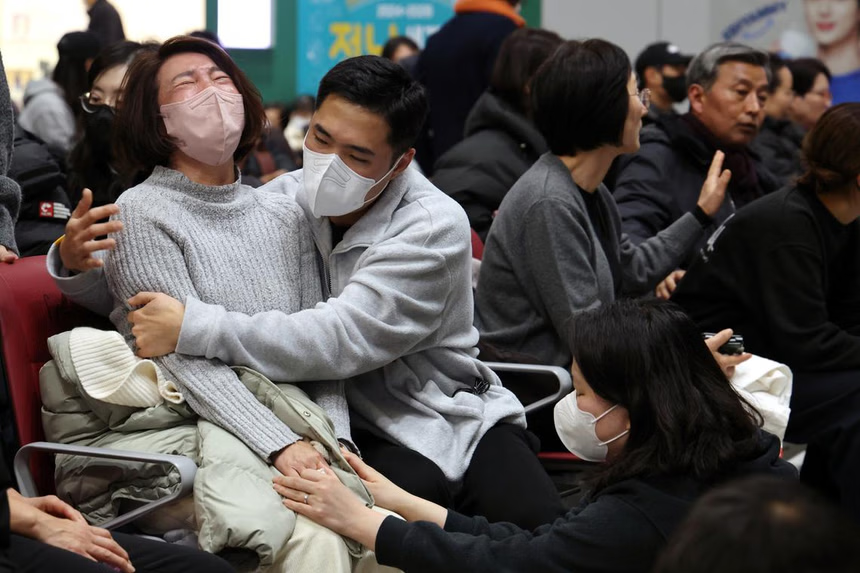The recent tragedy involving a Jeju Air flight has left an indelible mark on the hearts of countless families. The horrific plane crash, which occurred on Sunday, December 29, claimed the lives of 179 out of the 181 passengers on board. In the aftermath of this devastating event, grieving families are speaking out, sharing their heartbreak and stories of loved ones lost.
A Devastating Plane Crash: What Happened?

The Jeju Air flight took off from Suvarnabhumi Airport near Bangkok, Thailand, en route to South Korea’s Muan International Airport. Tragically, the Boeing 737-800, carrying 181 people, including six crew members, failed to land safely. According to eyewitness reports and video footage, the plane skidded off the runway and collided with a wall, erupting in flames.
Authorities believe that the crash occurred due to the plane’s landing gear malfunctioning after a bird strike. Air traffic controllers reportedly warned the pilots about the risk of bird strikes just three minutes before the ill-fated landing attempt. One minute later, the pilot declared a mayday, signaling a critical emergency. Despite their efforts, the flight ended in tragedy.
The Grim Toll: Victims and Survivors
The National Fire Agency confirmed the heartbreaking toll: 179 lives were lost, including 85 women, 84 men, and 10 others whose genders were not immediately identifiable. The victims included passengers of various nationalities, and among the deceased were families, children, and young adults returning from vacations.
Miraculously, two passengers survived the crash. Both were found in the tail section of the wreckage, suffering from moderate injuries. These survivors are now under medical care, and their recovery will undoubtedly take time, both physically and emotionally.
Heartbroken Families Share Their Grief
For the families of the victims, the pain is unbearable. Many have come forward to share their sorrow and the stories of their loved ones. One such voice is that of 78-year-old Maeng Gi-su, who lost his nephew and his nephew’s two sons in the crash. The family had been on holiday to celebrate the youngest son’s college entrance exams being over.
“I can’t believe the entire family has just disappeared. My heart aches so much,” Maeng shared, his grief echoing the sentiment of countless others.
Similarly, the cousin of a Thai passenger, 49-year-old Jongluk Doungmanee, expressed her shock and disbelief. “I was shocked. I had goosebumps. I couldn’t believe it,” she said, recounting the moment she learned of the tragedy.
These personal stories highlight the immense human toll of the crash, putting faces and names to the devastating statistics.
National Mourning in South Korea

In response to the tragedy, the South Korean government has declared a seven-day national mourning period. Memorial altars are being set up nationwide to honor the victims and provide a space for collective grieving. Flags have been flown at half-staff, and citizens are paying their respects in solemn ceremonies.
The Yonhap news agency reported that the runway at Muan International Airport will remain closed until January 1 as investigators analyze the wreckage. The closure is a stark reminder of the magnitude of the disaster.
The Role of Bird Strikes in Aviation Tragedies
Bird strikes, while relatively uncommon, can pose a serious threat to aircraft safety. In this case, it’s believed that birds caused a malfunction in the plane’s landing gear, which played a key role in the crash. The Independent reported that the warning from air traffic controllers about the bird strike risk came just minutes before the tragic landing attempt.
This raises questions about the measures in place to prevent such accidents. Airports worldwide employ various strategies, including radar systems, bird deterrents, and habitat management, to minimize the risk of bird strikes. However, as this tragedy shows, even the most advanced precautions cannot eliminate the risk entirely.
Harrowing Footage Captures the Final Moments

The terrifying final moments of the flight were captured on video by witnesses at the airport. The footage shows the plane skidding off the runway, colliding with a wall, and erupting in flames. These images are haunting and have been widely circulated in the media, serving as a grim reminder of the fragility of life.
For the families of the victims, these images are a painful visual representation of their loss. They also underscore the need for continued efforts to improve aviation safety and prevent similar tragedies in the future.
A Call for Answers: Investigations Underway
As the world mourns, investigators are working tirelessly to uncover the cause of the crash. The focus remains on the bird strike and the subsequent malfunction of the landing gear. The South Korean transport ministry is leading the investigation, with assistance from international aviation experts.

Families of the victims are demanding answers and accountability. They want to ensure that lessons are learned from this tragedy so that no other families have to endure similar heartbreak.
Conclusion
The Jeju Air plane crash is a tragedy that has left an entire nation—and the world—grieving. The loss of 179 lives is an unimaginable blow, and the pain felt by the victims’ families is immeasurable. As investigations continue, it is essential to honor the memories of those lost and support their loved ones in their time of need.
This tragedy serves as a somber reminder of the risks inherent in air travel and the importance of ongoing efforts to improve safety measures. While nothing can undo the heartbreak of this event, the collective grief and resolve of those affected will hopefully lead to meaningful changes in the aviation industry.
Our hearts go out to everyone touched by this devastating accident. May the victims rest in peace, and may their families find strength in the days ahead.


